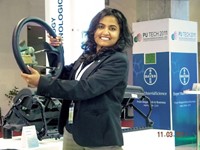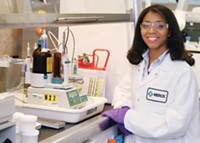Advertisement
Grab your lab coat. Let's get started
Welcome!
Welcome!
Create an account below to get 6 C&EN articles per month, receive newsletters and more - all free.
It seems this is your first time logging in online. Please enter the following information to continue.
As an ACS member you automatically get access to this site. All we need is few more details to create your reading experience.
Not you? Sign in with a different account.
Not you? Sign in with a different account.
ERROR 1
ERROR 1
ERROR 2
ERROR 2
ERROR 2
ERROR 2
ERROR 2
Password and Confirm password must match.
If you have an ACS member number, please enter it here so we can link this account to your membership. (optional)
ERROR 2
ACS values your privacy. By submitting your information, you are gaining access to C&EN and subscribing to our weekly newsletter. We use the information you provide to make your reading experience better, and we will never sell your data to third party members.
Environment
Steven W. Meier
A mother's support, a magnet school, and an ACS scholarship spur this engineer's journey from small-town Oklahoma to ExxonMobil R&D
by Linda R. Raber
January 25, 2010
| A version of this story appeared in
Volume 88, Issue 4

Parental support can catalyze profound transformations. For ACS Scholar Steven W. Meier, his mother's willingness to let him leave the nest a little early, combined with some financial assistance from the American Chemical Society, helped to create a Ph.D. chemical engineer whose fundamental research skills have landed him in the laboratories of ExxonMobil Research & Engineering.
Members of the Citizen Potawatomi Nation, an American Indian tribe, Meier's family moved from the Oklahoma City area to Chickasha, a small town about 30 miles to the southwest when he was 13. That he would be drawn to science and mathematics wasn't a given; he didn't have scientist role models. "My mother doesn't have a technical background; she's a single parent and works as a secretary in Chickasha," he says. Her nontechnical background, however, didn't stop her from fostering her sons' interest in science and math. "It didn't seem to matter. She always encouraged my brother and me and kindled our interest in science," Meier says.
Such was Meier's mother's confidence in her children that she let both of her sons—first Steven, and four years later, John—leave Chickasha for Oklahoma City to spend their final two years of high school at the residential Oklahoma School of Science & Mathematics (OSSM). The extremely competitive school has a selective admissions policy and a demanding curriculum that offers science courses at levels far beyond the usual high school offerings.
"At OSSM, I went through ordinary differential equations and multivariable calculus. In chemistry, I went through advanced general chemistry and biochemistry," Meier says. "My chemistry professor, that's what we call our teachers there, told me about the ACS Scholars program and encouraged me to apply. He knew this was an opportunity that could help me financially."
After graduation in 1998, with the help of a scholarship from ACS and generous financial aid from other sources, Meier headed for Rice University and a bachelor's degree in chemical engineering, which he received in 2002. The interdisciplinary nature of engineering appealed to him then as it does now. "When you're in high school, you can make vague connections between physics and chemistry. You learn about these connections in college and you find out that they are very messy, which is great," he says.
"Engineers also provide a lot of things to society, in terms of technical advancement, and chemical engineering seemed like a really exciting place to be. That's probably why I headed in this direction," he recalls.
Specifically, "ACS scholarship money helped to change the balance of my financial aid, so I could focus more on my studies and on undergraduate research. Rice has fantastic financial aid programs, so it wasn't the case that I would have had to take a part-time job as it is with people who are attending some other schools. What it did is reduce any loan burden I had," Meier says.
"I was able to do research for academic credit and as work-study. It was an educational opportunity for me to be immersed in technical things I was really interested in. The ACS scholarship made that happen," he says. On an emotional level, knowing that ACS was willing to support the cost of his education provided him with "a great sense of validation" of his career choices.
Meier chose Northwestern University for graduate school and completed a Ph.D. in chemical engineering there in 2007. His research focused on mixing and segregation of granular material using a dynamical systems approach.
Ph.D. in hand, Meier, then 28, landed a job at ExxonMobil Research & Engineering, in Annandale, N.J., a long way from Oklahoma—literally and figuratively. "I am in what is called Corporate Strategic Research, and I study the interaction between particulate materials and the fluids that may transport them in systems such as slurries and how the combination of this interaction with particle-particle interactions culminates in bulk transport properties," Meier tells C&EN.
Meier's appetite for interdisciplinarity is well fed at ExxonMobil, where he works with chemical engineers, physicists, geologists, mechanical engineers, and applied mathematicians in a close-knit group. There, he relishes the "opportunity to learn how people with different backgrounds and training might approach all sorts of different problems."
Please contact Kathy Fleming in the ACS Development Office for more information on contributing to this important program. She may be reached at (800) 227-5558, ext. 6250, or by e-mail at k_fleming@acs.org.





Join the conversation
Contact the reporter
Submit a Letter to the Editor for publication
Engage with us on Twitter